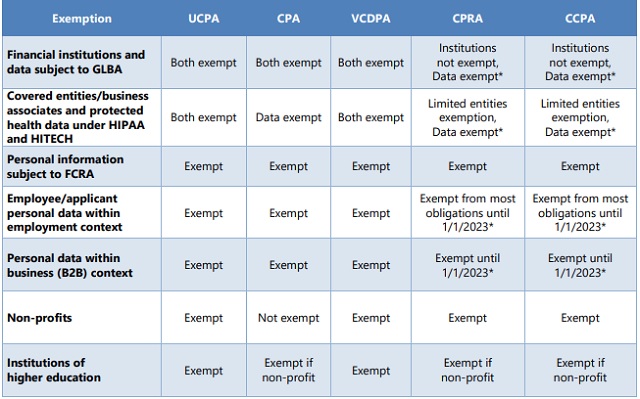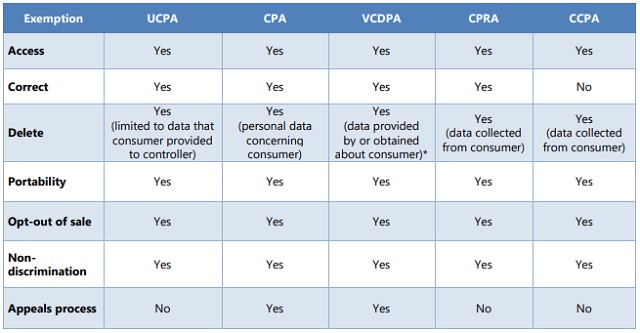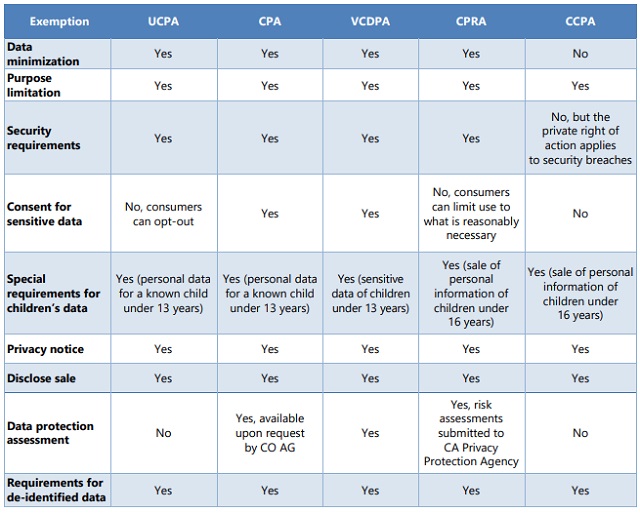Following in the footsteps of California, Virginia and Colorado, Utah has become the fourth state to pass comprehensive consumer data privacy legislation. The Utah Consumer Privacy Act ("UCPA") was introduced on February 17, 2022, passed through the Utah Senate unanimously in just one week (February 25, 2022) and passed out of the Utah House the next week (March 2, 2022), again unanimously. Utah Governor Spencer Cox signed the bill (SB 227) into law on March 24, 2022, and the UCPA will take effect on December 31, 2023. The swift and unanimous passage of a complex, comprehensive data privacy law would be remarkable under any circumstances, but the UCPA's rapid enactment is particularly noteworthy given the number of state law proposals that remain bogged down (e.g., Arizona, Georgia, Maine) or that died (e.g., Florida, Indiana, Mississippi) already this year. While bills are still alive in some other states (e.g., Alaska, Connecticut, Ohio, Pennsylvania), Utah is the first major state law domino to fall in 2022 and the first state to enact comprehensive data privacy legislation since Colorado in July 2021.
Companies that followed the passage of the California Consumer Privacy Act ("CCPA"), the California Privacy Rights Act ("CPRA"), Virginia's Consumer Data Protection Act ("VCDPA") and the Colorado Privacy Act ("CPA") likely will not struggle to meet the familiar requirements set out by the UCPA. Similar to the VCDPA and CPA, Utah's UCPA adopts the "controller" and "processor" nomenclature used in the EU General Data Protection Regulation ("GDPR") and does not include a private right of action for consumers to sue for potential violations. Also like the GDPR and the other state frameworks, the UCPA grants consumers certain rights over their personal data.
However, the UCPA has some key distinctions. For example, the UCPA does not grant consumers the right to correct inaccuracies in their personal data and does not require controllers to conduct data protection assessments of certain processing activities. And unlike the VCDPA and CPA, both of which require opt-in consent for the collection and processing of "sensitive data," the UCPA instead requires covered entities to provide notice and an opportunity to opt-out prior to processing a consumer's "sensitive data."1 Further, instead of getting routed directly to the Utah Attorney General ("AG"), consumer complaints first go to the Utah Division of Consumer Protection within the Utah Department of Commerce, which may refer complaints to the AG. Neither the AG nor the Division of Consumer Protection have explicit rulemaking authority under the statute.
Scope
The UCPA covers for-profit entities that conduct business in Utah—or produce a product or service targeted to Utah residents—that (1) have annual gross revenues of at least $25 million and (2) either (i) control or process the personal data of at least 100,000 Utah residents or (ii) derive over 50 percent of gross revenue from the "sale" of personal data and control or process personal data of at least 25,000 residents.2 Covered businesses are considered either a "controller" or a "processor" under the UCPA's statutory scheme.3
The UCPA defines "consumer" as an individual who is a resident of Utah acting in an individual or household context and only applies to the personal data of consumers—not personal data collected in an employment or commercial (business-to-business) context. The UCPA defines "personal data" as information linked or reasonably linkable to an identified or identifiable individual, with exceptions for de-identified data, aggregated data and publicly available information. Entities subject to the UCPA need not re-identify de-identified or pseudonymous data in order to comply with the statute's obligations.
Exemptions
Like the CCPA, CPRA, VCDPA and CPA, the UCPA exempts certain types of data and certain entities. Notably, the UCPA exempts information and entities regulated by both the Health Insurance Portability and Accountability Act ("HIPAA") and the Gramm-Leach-Bliley Act ("GLBA"), institutions of higher education, nonprofits, tribes and consumer reporting agencies subject to the Fair Credit Reporting Act ("FCRA").
COMPARING EXEMPTIONS IN STATE PRIVACY LAWS

* Subject to private right of action in the context of a data breach.
Data Subject Rights
The UCPA, like its counterparts, provides consumers with rights relating to personal data processed by controllers and processors, rights which consumers may request to exercise using methods specified by the controller in the required privacy notice. These consumer rights include:
- Confirmation that a controller is processing the consumer's personal data
- Access to the consumer's personal data
- Deletion of the personal data that the consumer provided to the controller
- Data portability: the right to obtain a copy of the personal data, in a "portable" format, that the consumer provided to the controller
- Opt-out of the "sale" of personal data or the processing of personal data for targeted advertising
Notably, like the CCPA and CPRA, the UCPA limits the consumer deletion right to personal data that the consumer provided to the controller. And disclosure of personal data to third parties is not considered a sale if the purpose is consistent with a consumer's reasonable expectations.
COMPARING CONSUMER RIGHTS UNDER STATE PRIVACY LAWS

* Recognizing the operational difficulties that indirect data collectors face in processing deletion requests, Virginia has passed a bill (HB 381) permitting businesses that collect data indirectly about (rather than directly from) a consumer to opt the consumer out of processing as an alternative to deletion or to retain the minimal data necessary to ensure effective deletion. The Virginia Governor has until April 11, 2022 to act on the bill.
Data Controller and Processor Obligations
Like the VCDPA and CPA, the UCPA adopts the "controller" and "processor" structure set forth in the GDPR. Before a processor performs any processing on behalf of a controller, the UCPA requires the parties to enter into a contract establishing the details of the processing, along with the parties' rights and obligations. The agreement must set forth:
- Instructions for the processing
- The nature and purpose of the processing
- The type of data subject to processing
- The duration of the processing
Processors must adhere to the instructions of the controller and take appropriate technical and organizational measures to assist the controller in meeting its obligations, including as related to security of personal data and breach notification. The data processing contract also must set forth the following processor obligations:
- Follow the controller's instructions when processing data
- Ensure that all persons handling personal data are subject to a duty of confidentiality with respect to the personal data
- Engage any subcontractors via a written agreement that requires the subcontractor to meet the same obligations as the processor with respect to the personal data
In addition, the UCPA requires controllers to provide consumers with a reasonably accessible and clear privacy notice. But, unlike the CPA, VCDPA and CPRA, the UCPA does not require controllers to conduct data protection assessments of certain processing activities. The privacy notice must disclose:
- Categories of personal data processed by the controller
- Purposes for such processing
- How consumers can exercise their rights under the law
- Categories of personal data that the controller shares with third parties
- Categories of third parties with whom the controller shares personal data
DATA CONTROLLER OBLIGATIONS UNDER STATE PRIVACY LAWS

Effective Dates and Enforcement
The UCPA's enactment adds to an evolving timeline of data privacy laws and regulations. The CCPA and its implementing regulations, of course, are already in effect and enforceable. The CPRA becomes operative January 1, 2023, and enforceable on July 1, 2023, along with regulations to be adopted by the new California Privacy Protection Agency ("CPPA") on or before July 1, 2022 (however, the draft regulations are currently past due for public notice and comment, and the CPPA executive director has acknowledged that draft regulations may be delayed until fall 2022). Likewise, the Colorado AG has announced that his office will issue a notice of rulemaking and draft regulations by fall 2022, to be finalized and adopted by July 1, 2023, when the CPA takes effect. The VCDPA, meanwhile, takes effect January 1, 2023, without rulemaking or regulations. The UCPA is now the latest entry on the data privacy law calendar, taking effect on December 31, 2023, also without rulemaking or regulations.
The UCPA expressly does not create a private right of action. Rather, the AG is given the exclusive authority to enforce the statute, but only on referral from the Utah Division of Consumer Protection, which can receive and investigate complaints and provide consultation and assistance to the AG. The AG must give businesses 30 days to cure alleged violations, after which, if no cure, the AG can bring an action to recover actual damages (to the consumer) and statutory penalties of up to $7,500 per violation of the statute.4 All recovered funds go to the newly created Consumer Privacy Account, which will be used to fund future enforcement efforts and offset enforcement fees and costs. The AG and the Division of Consumer Protection must compile a report evaluating the UCPA's liability and enforcement provisions and summarizing the data protected and not protected by the statute and submit the report to Utah's Business and Labor Interim Committee by July 1, 2025. Given that only 18 months will pass between the effective date of the UCPA and the required issuance of the report summarizing its effectiveness, we may reasonably expect significant activity from the Division of Consumer Protection and the AG. These agencies may take relatively more concerted action to conduct investigations and bring enforcement actions in order to demonstrate their effectiveness in exercising the new authorities conveyed to them by the UCPA.
Footnotes
1 "Sensitive data" is defined as (i) personal data that reveals an individual's racial or ethnic origin, religious beliefs, sexual orientation, citizenship or immigration status, or information regarding an individual's medical history, mental or physical health condition, or medical treatment or diagnosis by a health care professional; (ii) processing of genetic personal data or biometric data for the purpose of identifying a specific individual; or (iii) specific geolocation data.
2 "Process" is defined as an operation or set of operations performed on personal data, including collection, use, storage, disclosure, analysis, deletion or modification.
3 "Controller" is defined as a person doing business in the state who determines the purposes for which and the means by which personal data is processed, regardless of whether the person makes the determination alone or with others. "Processor" is defined as a person who processes personal data on behalf of a controller.
4 The CPRA authorizes, but does not require, the CPPA to allow companies to cure violations. The cure periods for Virginia (30 days) and Colorado (60 days) are mandatory; although in Colorado, the cure provision expires on January 1, 2025.
Visit us at mayerbrown.com
Mayer Brown is a global legal services provider comprising legal practices that are separate entities (the "Mayer Brown Practices"). The Mayer Brown Practices are: Mayer Brown LLP and Mayer Brown Europe – Brussels LLP, both limited liability partnerships established in Illinois USA; Mayer Brown International LLP, a limited liability partnership incorporated in England and Wales (authorized and regulated by the Solicitors Regulation Authority and registered in England and Wales number OC 303359); Mayer Brown, a SELAS established in France; Mayer Brown JSM, a Hong Kong partnership and its associated entities in Asia; and Tauil & Chequer Advogados, a Brazilian law partnership with which Mayer Brown is associated. "Mayer Brown" and the Mayer Brown logo are the trademarks of the Mayer Brown Practices in their respective jurisdictions.
© Copyright 2020. The Mayer Brown Practices. All rights reserved.
This Mayer Brown article provides information and comments on legal issues and developments of interest. The foregoing is not a comprehensive treatment of the subject matter covered and is not intended to provide legal advice. Readers should seek specific legal advice before taking any action with respect to the matters discussed herein.








